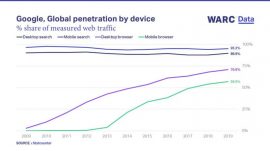Google, Facebook ad gains continue to shrink what’s left for everyone else, says analyst firm


With Google and Facebook gobbling up more of the internet ad market this year, the rest of the players are left battling for a shrinking slice of the pie, according to research and consulting firm WARC’s latest Global Ad Trends report.
Duopoly’s growing share. The report has the duopoly growing its share in 2019 to command 61.4 percent of all internet ad spend, resulting in the first decline (by 7.2 percent) of the ad spend available to other online media owners. In fact, when WARC looked at all advertising expenditures, online or off, Google and Facebook will bring in 29 percent of the total — $176.4 billion.
Why you should care. The reason Google and Facebook have been so successful, according to WARC, is their development and dominance of the ad formats online marketers have found to perform most effectively: paid search and social. Additionally, the ease of use of the self-service ad buying tools offered by both companies make their products accessible to nearly every business, from the largest to the tiniest, wrote WARC data editor James McDonald.
That doesn’t mean there aren’t alternatives and challengers, however.
Enter Amazon. But their dominant positions aren’t unchallenged. Amazon this year has released a number of improvements to its ad-buying interfaces, such as improving the usability of its DSP, extending the reach of Sponsored Products, adding a rewards program tool, incorporating customer acquisition metrics and enabling dynamic bidding for Sponsored Products ads.
WARC pegs Amazon revenues from advertising at $14 billion in 2019. It’s just 13 percent of Google’s forecast $107 billion in ad revenues this year, but, just as our own Amazon advertising survey noted, WARC found 69 percent of marketers responding to its poll intended to increase their Amazon ad spending in 2019. And WARC notes that the Amazon business threatens Google’s paid search dominance the most significantly, because the retailer can easily match up advertisers with customers that are nearly ready to make a purchase.
Though smart speakers like Amazon’s Alexa and Google Home aren’t yet monetizing their voice search results with ads thus far, WARC notes that Amazon’s devices are used by 63 percent of smart speaker owners, many more than use Google’s version, and they also boast 15 times more Skills than Google’s platform.
Facebook Watch hasn’t broken through. WARC notes that Google’s main competitor for streaming video dollars — valued at $30 billion in 2018 and growing rapidly — is Facebook, which has sought to position Watch as a brand-safe YouTube alternative. It hasn’t yet made much headway, however.
When it comes to competition, Facebook has done a great job of hedging its bets by developing its Instagram property at a time when Edison figures suggest as many as 15 million U.S. users — most between 12 and 34 — have departed Facebook’s core platform since 2017.
The post Google, Facebook ad gains continue to shrink what’s left for everyone else, says analyst firm appeared first on Marketing Land.
From our sponsors: Google, Facebook ad gains continue to shrink what’s left for everyone else, says analyst firm



